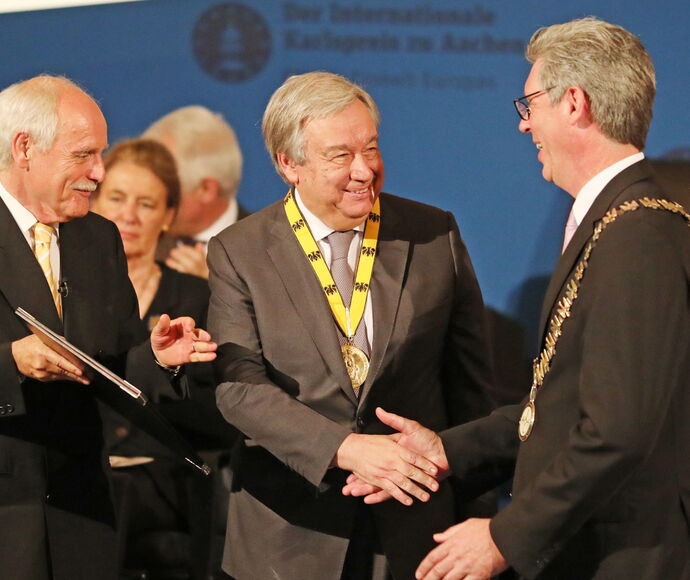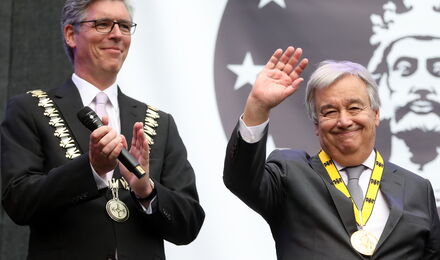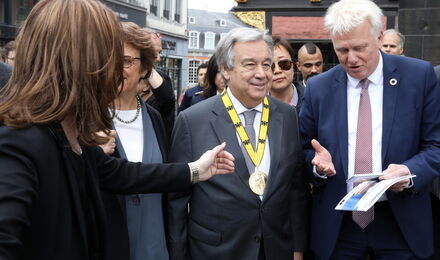I.
Globalisation highlights the extent to which we are interconnected and interdependent worldwide and how important it is to maintain ethical principles. The refugee crisis, if we needed reminding, has shown that politics in Europe can no longer be viewed in isolation from the conflicts and wars in the Middle East. Global climate change is making it dramatically clear that economic growth must go hand in hand with the well-being of people and the environment. And alongside global ecological, economic and social issues, the fight for greater justice and against hunger and poverty in the world is a challenge that industrialised civilisational society is facing.
Europe's aim is to protect and promote its values and interests in relation to its continental neighbours, to contribute to peace, security and sustainable global development, to maintain solidarity and mutual respect among peoples, to contribute to free and fair trade, to the eradication of poverty and to the protection of people, and to uphold the principles of the United Nations Charter.
These goals, which are geared towards a peaceful, multilateral and united world, correspond to a social model that the two major peace projects of our time, the European Union and the United Nations, represent; a social model that opposes unilateralism, selfishness and isolationism just as much as it does state control, nationalism and populism, which threaten freedom.
Since the beginning of 2017, the former Portuguese Prime Minister António Guterres has been the first European in over 30 years to bear significant responsibility for the work of the United Nations. Guterres is now acting on the basis of the common values and convictions that the European Union has formulated for itself in the complex global world in order to implement pluralism, tolerance and dialogue, cross-border cooperation, above all peace, freedom and democracy.
Such an undertaking is not free from setbacks.
However, the Board of Directors of the Society for the Conferring of the International Charlemagne Prize of Aachen is encouraging the Secretary-General of the United Nations, António Guterres, for such a significant commitment and, in recognition of his efforts to revitalise and consolidate multilateral cooperation based on the values and goals of the European Union and the United Nations, is awarding him the International Charlemagne Prize of Aachen for 2019.
‘Everything we strive for as a human community – dignity, hope, progress and prosperity – depends on peace. But peace depends on us.’ Guterres said this on 1 January 2017 at the beginning of his term of office at the UN. He called for solidarity and compassion in everyday life, dialogue and respect across political divides.
‘To name and defeat political populism, racism, xenophobia and radical extremism – I have stood for this all my life,’ Guterres emphasised in his application to become Secretary-General of the United Nations, and – surprisingly quickly for many commentators – received the approval of the Security Council and the UN General Assembly. According to observers, it may well have been an advantage for the community of states, which is characterised by North-South tensions, that the Portuguese has an in-depth knowledge of the world's trouble spots and is very familiar with the needs of poorer and developing countries.
II.
António Guterres was born on 30 April 1949 in Santos-o-Velho, Lisbon. He completed his studies in electrical engineering at the Technical University in the Portuguese capital at the age of 22 with a degree in engineering.
After the Carnation Revolution in 1974, he joined Mário Soares' Socialist Party (PS), which played a major role in the democratisation of Portugal, and in 1974/75 headed the office of the Minister of Industry. In 1976, he won a mandate in the Lisbon Parliament for the first time. From 1981 to 1983, he also sat on the Parliamentary Assembly of the Council of Europe, where he was deeply involved in migration and refugee policy issues. At the end of the 1980s, he took over as leader of the PS parliamentary group, and in 1992, as secretary-general, he also became leader of the Portuguese Socialists.
Three years later, after the PS won 112 of the 230 seats in the Chamber of Deputies, Guterres was appointed Prime Minister in October 1995 and formed a minority government that proved to be stable. Portugal subsequently set its sights on monetary union and was one of the eleven EU member states to adopt the euro on 1 January 1999.
Although the PS once again narrowly missed out on an absolute majority in the 1999 parliamentary elections, Guterres was re-elected. In the first half of 2000, the head of government, sometimes referred to by the media as a ‘pragmatic utopian’, used the Portuguese Council Presidency to accelerate the debate on a new contractual basis for the EU and was one of the masterminds behind the so-called ‘Lisbon Process’, which was intended to make the Union the world's leading knowledge-based economic area. His clear goal: more Europe: ‘More Europe in economic and social policy [...] More Europe in foreign policy and in the Common Security and Defence Policy [...] More Europe in the area of freedom, security and justice [...] More competences and responsibilities at the European level, albeit with a concept of subsidiarity that [...] allows for a fuller involvement of the national states and greater diversification, in order to preserve diversity in the European area, especially in the cultural sphere.’
Highly respected at the European level, Guterres drew the consequences at home from the PS's defeat in the municipal elections at the end of 2001. He resigned as party leader and head of government and was replaced by the new Prime Minister José Manuel Barroso after early elections in spring 2002. Internationally, Guterres, who had already tried to mediate in the conflicts in East Timor and Angola, remained a sought-after advisor and continued to be influential as President of the Socialist International (1999-2005).
It was therefore no surprise that the ‘well-connected popular figure’ (DW, 21 July 2005) was appointed United Nations High Commissioner for Refugees with effect from 15 June 2005 at the suggestion of then UN Secretary-General Kofi Annan.
III.
As the ‘guardian’ of the Geneva Refugee Convention, the Portuguese was henceforth responsible for refugee protection and the noble task of ensuring that the human rights and dignity of those seeking protection are respected and that the principle of non-refoulement is upheld (according to which none of the signatory states ‘shall expel or return (’refouler') a refugee in any manner whatsoever to the frontiers of territories where his life or freedom would be threatened on account of his race, religion, nationality, membership of a particular social group or political opinion).
Meanwhile, numerous countries, especially those directly bordering conflict zones, are not at all able to provide for, protect and fairly process a large number of refugees on their own. Thus, the work of the UNHCR is by no means ‘only’ to ensure that international agreements in favour of refugees are widely disseminated and observed by governments. Above all, the commission also provides emergency humanitarian relief to the host countries. For many people seeking protection, the UNHCR refugee camps are the first safe haven where they receive food, clean water, shelter and initial medical care.
The Herculean task with which the refugee commissioner was confronted and what Guterres himself called a ‘paradigm shift [...] an era in which the scale of global displacement and the response needed to address it dwarfs anything that has gone before’, becomes clear when one considers that the number of refugees in his ten-year term of office rose dramatically from around 38 million in 2005 to over 60 million in 2015.
Guterres undertook structural and organisational reforms and tripled the UNHCR's volume of activity. At the same time, the Portuguese increased political pressure and called for ‘serious reflection on the future’ to go beyond the immediate efforts to deal with the refugee crisis in Europe. [...] Much more must be done to prevent conflicts and stop the wars that force so many to flee their homes. The neighbouring countries of the conflict zones, where nine out of ten refugees worldwide live, must be given much more support, including the appropriate financial resources.’
IV.
The election of the European Guterres as UN Secretary-General should also be seen as a commitment by the international community to do more than ever before to give people fleeing from civil war, hunger and misery a perspective, while at the same time effectively combating the causes of flight in their countries of origin and managing global migration as a whole.
The Global Compact for Safe, Orderly and Regular Migration and the Global Compact on Refugees, which were negotiated during Guterres's still young term of office and on which the vast majority of UN member states have agreed, also serve these goals.
The Global Compact on Refugees has four main objectives: to ease the pressure on host countries, to increase the self-reliance of refugees, to expand access to admission programmes in third countries and to promote conditions in countries of origin that will allow for safe and dignified returns.
The Global Compact for Migration is the first agreement negotiated between states under the umbrella of the United Nations that addresses the most diverse aspects of global migration management and, above all, takes into account the fact that migratory movements can no longer be managed at the national level alone, but can only be addressed at the global level.
Guterres calls on the international community to show ‘more action and more ambition’ – in matters of refugee and migration policy as well as in overcoming ‘the greatest challenge of our time’: climate change.
‘The world risks crossing the point of no return on climate change, with devastating consequences for the people on the planet and for the natural systems that sustain them [...] The pledges made by heads of state when they adopted the Paris Agreement three years ago were the very minimum needed to avoid the worst consequences of climate change,’ he emphasised, adding that the states must take more decisive action and act with a greater sense of urgency against the “direct existential threat” of climate change. ‘Simply put, we have to curb the emission of deadly greenhouse gases and promote climate protection,’ because, as Guterres told the participants at the World Climate Conference in Katowice, Poland, a few weeks ago, climate change is already “a matter of life and death” for many people and even entire countries.
It is pleas such as these with which Guterres impresses and makes himself heard. As Secretary-General of the United Nations, he does not have power in the traditional sense. Rather, it is the power of persuasion and the personality of this ‘man of vision, heart and action’ (according to EU High Representative Federica Mogherini) that give Guterres's words weight – at a time when a revitalisation of multilateral cooperation is so urgently needed because, as Guterres says, ‘even in democracies, trust in one's own institutions, in governments and the media, is waning. Mistrust and fear are growing. Even in Europe, people seem to think it's better to close the doors – that is, the borders. Yet we know that this path leads to the dead end of history. Do we want to tackle the consequences of climate change alone? The challenges posed by the digitisation of the world and by artificial intelligence, which will blow apart everything we have known so far? The structure of entire societies will change completely. The more complex the world, the greater the risks, the more we need common ground. And the United Nations provides the platform for developing common interests.’ (Stern, 25 February 2018)
V.
At a time when universal rights are increasingly being undermined and democratic principles are under pressure, the Board of Directors of the Society for the Conferring of the International Charlemagne Prize of Aachen honours the Secretary-General of the United Nations, António Guterres, an outstanding champion of the European social model, of pluralism, tolerance and dialogue, of open and solidary societies, of a strengthening and consolidation of multilateral cooperation and of a community of states that effectively addresses the existential challenges of the 21st century, in particular the balancing of the North-South divide and the protection of our natural resources.
The award ceremony is intended to encourage all those who want to strengthen Europe's role in the world in the service of peace, understanding, social and territorial cohesion of peoples, and human well-being.












